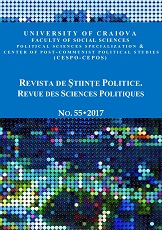The Socialist Trend in the Modern Romania and Its
Influence on the Social Structures
The Socialist Trend in the Modern Romania and Its
Influence on the Social Structures
Author(s): Florin NacuSubject(s): Politics / Political Sciences, History, Social Sciences, Political Theory, Political history, Social history
Published by: Editura Universitaria Craiova
Keywords: socialism; oligarchy; political trends; social structures; revolution
Summary/Abstract: The article depicts the manner in which the socialist trend tried to influence the political life in modern Romania. The socialists tried to create theoretical patterns, influenced by similar trends from the industrialised societies of the Western Europe, along with those coming from the neighbouring Eastern society, the Tsarist Russia. The social conditions from Romania were not similar to those of the occidental states, as much as the level of the political culture did not allow the peasants and the workers to fight a battle. Moreover, the electoral system left only limited possibilities for the front-ranker peasants, who only wished to enlarge their property, not to adhere to the socialist values. Many of the socialists integrated among the liberals, those who remained faithful reorienting themselves towards the communist trend, after 1981. On the background of a relative antipathy against Russia, especially after 1979, the Romanian politicians kept the socialists under observation. After 1921, when the socialists organised themselves in the Communist Party from Romania, their ideological affiliation to the Soviet directives, obliged them to adopt an antinational attitude, not only an “anti-oligarchic” one, which, in 1924, outlawed them, for the following two decades.
Journal: Revista de Științe Politice. Revue des Sciences Politiques
- Issue Year: 2017
- Issue No: 55
- Page Range: 22-31
- Page Count: 10
- Language: English

